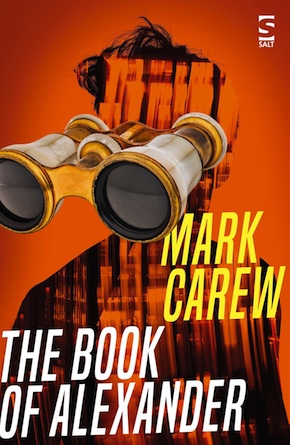Be creative
by Mark Carew
“Raymond Chandler meets Maurice Sendac… exquisite.” Alison Baverstock
Let’s say you would like to write a novel. You have a plot summary, gained over weeks, months, years, which has formed in your mind while you have been out walking, running, having a bath. The plot is simple and effective, and you can describe it in less than a minute. Your friends like your characters, who you have been mentally revising in response to their questions. The plot has held together after attacks from all sides. You might be on to something here, so now you need to be brave and write a scene.
Let’s say you write one scene, and then another, until the whole thing doesn’t look too bad. You know the advice about Show Not Tell, and realise that there are a lot of Tells in the opening chapter. Completely normal. Just revise the scene from the characters’ point of view, report back, make it real – that’s a nice exercise to do! Your characters are now breathing, they have somewhere to live, and they are wondering what happens next.
In One Two Buckle My Shoe, my current reading matter, Agatha Christie takes the first chapter to introduce Mr Morley the dentist and a slew of characters, and ends with a lady losing a buckle from her shoe when she steps out of a car. Everything is neatly in place, the stage is set, and then something happens. Inspector Japp of Scotland Yard informs Hercule Poirot that Mr Morley has been found dead; shot, a certain case of suicide. Poirot, who was a patient of Morley’s that morning, thinks it was murder.
There was the idea that Dame Agatha wrote a novel until the penultimate chapter, then decided on who would make a good murderer. She then went back and edited the details to make it so. Whether true or not, the point of this explanation is to be aware that you must talk to your characters. Then they will say: “Oh, no, I couldn’t possibly be the murderer, and this is why…” Whereas another character will say, “It was me, and my motive just became clear.”
Pixar Films had a six-step plot summary that ran: Once Upon A Time There Was, Every Day, Then One Day, Because Of That, Because Of That, Until Finally. Once upon a time there was a dentist, who treated his patients every day. He was a very good dentist. One day he was found dead. Because of that (times many) Poirot investigated the idea of suicide, and soon found evidence for murder, until finally all was revealed.
You will need tactics to move from one scene to the other. Over the years I’ve used StoryCubes, photographs, paintings, the methods of the Oulipo, and requests to my unconscious.”
Simple and satisfying. Put some characters in a waiting room, a rainforest, space station, wind them up, and see what happens. The ideas for your story or novel will have to be strong because the characters will test out your ideas for you.
There will, naturally, be holes in your first draft; you may not even have a middle. So you will need tactics to move from one scene to the other. Over the years I’ve used StoryCubes, photographs, paintings, the methods of the Oulipo, and requests to my unconscious.

How about making a model of your location?
StoryCubes are a genius invention that help writers practise the skill of linking disparate information together and making stories. You can, for example, roll six dice and assign each one to a place in the Pixar storyline.
Photographs and paintings give you details of other worlds. If you need the interior of a house, can you find a photograph of it? Or how about making a model of your location? For Magnus, my second novel, set on a remote island in the Norwegian Sea, I made a diorama of the island. I learnt about the routes up and down the mountain and how to reach the hidden cave at the back. The boulders that litter the place were never in my original conception of the island, but they turned out to be very useful indeed.
The Oulipo were and still are a collection of mathematicians (mostly) interested in writing stories using rules and constraints. My top advice is Be Creative! Do strange things like writing poems by using the words of a length defined by the digits in the mathematical constant pi.
Sometimes, your conscious brain will be unable to help you out. So instead make a request to your unconscious for help. These are the “boys in the back room” (as Stephen King calls them in On Writing). “Boys, let me know in the next few days, would you, what the detective finds in the chest that links the bishop to the actress.” Don’t push it, and don’t sweat it; the ideas will come.
I’d be lying, however, to say it was a simple as that. You will need to develop the ability to write a certain number of words per day, and to do this when you are completely knackered. I can now sit at my desk when I have an hour or two free and write one thousand words. I write for 15 minutes, have a break and write for another 15 minutes, until it’s done. This is the Pomodoro time management technique, it limits the pain to a few minutes at a time; a bit like fartlek training for writers.
You will also need to take entire days away to write. Treasure these, and protect your leisure time jealously. I had a week at home alone recently, and knew it was a chance to finish Magnus before the new academic year hit. I didn’t come out of the house for three days. By the end of the week I was talking to the walls and agreeing with them. But what bliss, because I finished that draft and it was all right.
 Mark Carew was born in Wales and brought up near Sudbury, Suffolk. He studied Biochemistry at King’s College, London, and received a PhD in Cell Physiology from Cambridge in 1995. After post docs in Cambridge and North Carolina, he worked as a medical writer before joining Kingston University where he is an Associate Professor. His stories have appeared in print and online in various literary magazines. The Book of Alexander, his first novel, is published in paperback by Salt, who will publish his second novel Magnus in 2019.
Mark Carew was born in Wales and brought up near Sudbury, Suffolk. He studied Biochemistry at King’s College, London, and received a PhD in Cell Physiology from Cambridge in 1995. After post docs in Cambridge and North Carolina, he worked as a medical writer before joining Kingston University where he is an Associate Professor. His stories have appeared in print and online in various literary magazines. The Book of Alexander, his first novel, is published in paperback by Salt, who will publish his second novel Magnus in 2019.
Read more
climbingthepyramid.com
@MarkACarew

